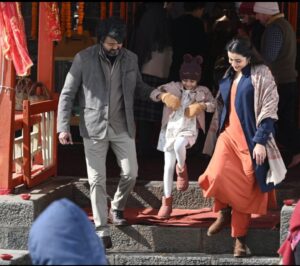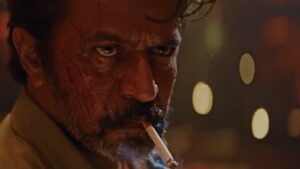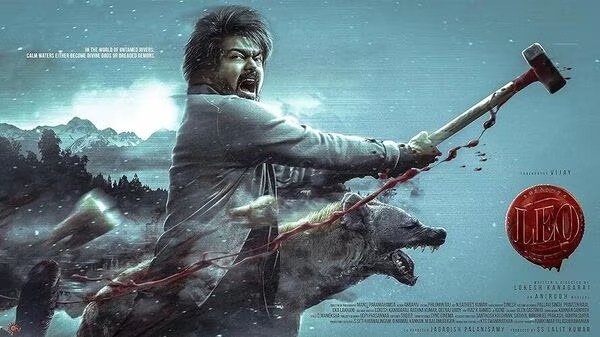–A Review By Maitreya Pawar
Leo, the latest offering in the cinematic universe of Lokesh Kanagaraj (LCU), has sparked fervent debates and discussions since its release. The film is a curious mix of brilliant moments and missed opportunities that left audiences divided.
The movie’s first half is a masterclass in character development and tension-building. Thalapathy Vijay’s portrayal of Parthiban, a cafe owner with a hidden past, is nothing short of exceptional. His transformation from a peaceful family man to a fierce protector is portrayed with remarkable attention to detail. The cafe robbery sequence, in particular, is a standout action set piece that pushes Parthiban to the edge, brilliantly capturing his internal struggle.
 Lokesh Kanagaraj’s expertise in crafting action scenes shines through in the film’s first half, leaving audiences craving more. The theme of violence and its consequences is established early on, as Parthiban’s past threatens to catch up with him. Vijay’s performance, including his emotional breakdown, is a testament to his dedication to the role.
Lokesh Kanagaraj’s expertise in crafting action scenes shines through in the film’s first half, leaving audiences craving more. The theme of violence and its consequences is established early on, as Parthiban’s past threatens to catch up with him. Vijay’s performance, including his emotional breakdown, is a testament to his dedication to the role.
The film explores the relationship between Parthiban and a hyena, highlighting the parallels between their lives. The theme of fear and the consequences of being hunted down is beautifully mirrored in both the character and the animal, setting the stage for the hyena to become an ally later in the film.
 The film’s interval block is particularly noteworthy, leaving audiences on a high as the tension escalates and Parthiban’s true identity is unveiled.
The film’s interval block is particularly noteworthy, leaving audiences on a high as the tension escalates and Parthiban’s true identity is unveiled.
However, the film’s second half takes a different trajectory, with the introduction of underdeveloped antagonists, Anthony Das and Harold Das, who fail to instill fear or intimidation. The origin story of Leo, presented in a flashback, lacks the impact one would expect. The action sequences in this segment fall short of the expectations set by the first half, with the choreography feeling substandard and gimmicky.
Vijay’s emotional breakdown scene in front of Trisha as he grapples with her lack of trust and her investigation into his past is brilliantly acted. The tension in this scene builds up to a moment of intimacy, where questions about Parthiban’s true identity come to the forefront.
 The introduction of CGI animals and certain action sequences that rely heavily on VFX could have been more convincing. The CGI hyena sequence, in particular, feels mediocre, failing to live up to expectations. The second half’s transition into an action-packed chase, while promising in theory, doesn’t translate into the adrenaline-pumping experience one would hope for.
The introduction of CGI animals and certain action sequences that rely heavily on VFX could have been more convincing. The CGI hyena sequence, in particular, feels mediocre, failing to live up to expectations. The second half’s transition into an action-packed chase, while promising in theory, doesn’t translate into the adrenaline-pumping experience one would hope for.
In a clever and subtle manner, the song weaves the theme of Leo’s life in the town with the song “Ordinary Person.” The lyrics say, “My life is in this town, and I ain’t going down. You think that I’m crazy, but I don’t want the crown.” At first, it might be perceived as a regular introduction song, but it echoes the essence of the entire film. The melodious tune “ANBENUM” adds depth to the emotional connection with the characters and the overall narrative.
 The film’s theme of violence and its consequences is further explored in the climax, where Leo confronts the Das Duo. While the film offers different versions of the climax, it leaves viewers with intriguing questions about the characters and their history.
The film’s theme of violence and its consequences is further explored in the climax, where Leo confronts the Das Duo. While the film offers different versions of the climax, it leaves viewers with intriguing questions about the characters and their history.
The film pays homage to Tamil cinema, referencing Kamal Hassan’s filmography and showcasing a love for the medium.
 Despite the second half’s shortcomings, Leo is an engaging film with moments of brilliance and a standout performance by Vijay. While some aspects of the film could have been executed better, it continues to generate discussions and theories among its audience.
Despite the second half’s shortcomings, Leo is an engaging film with moments of brilliance and a standout performance by Vijay. While some aspects of the film could have been executed better, it continues to generate discussions and theories among its audience.
As the Lokesh Cinematic Universe expands, the possibilities for future stories and character interactions are bound to be intriguing. The film may have its flaws, but it undeniably leaves viewers curious and eager for more.

















